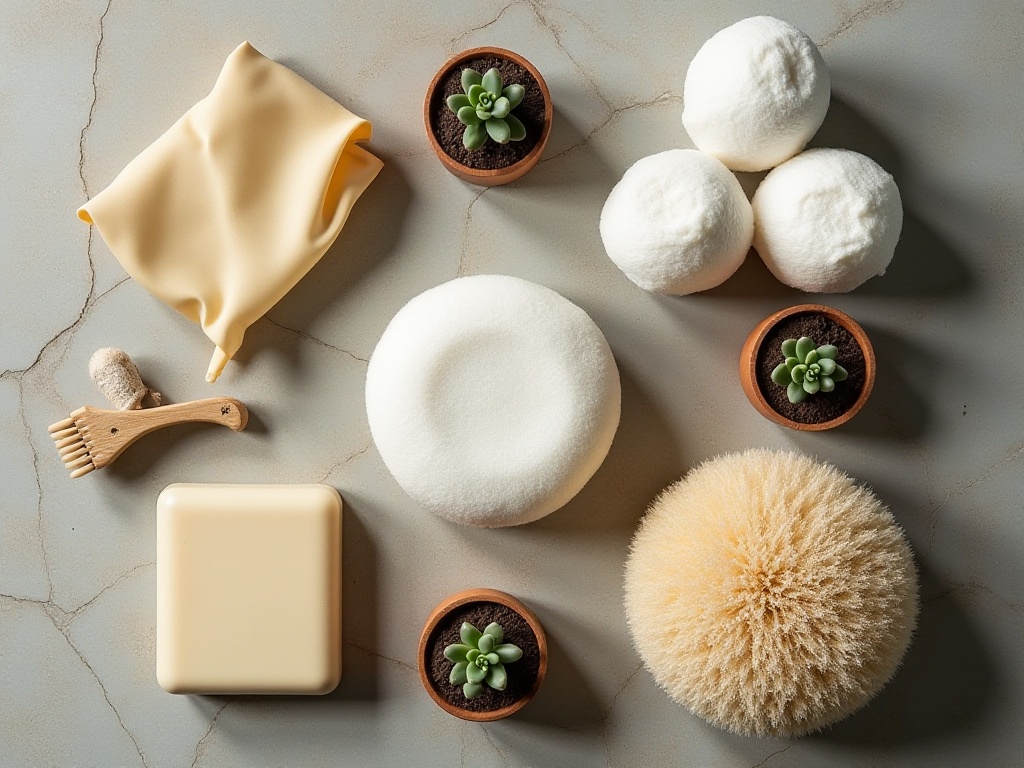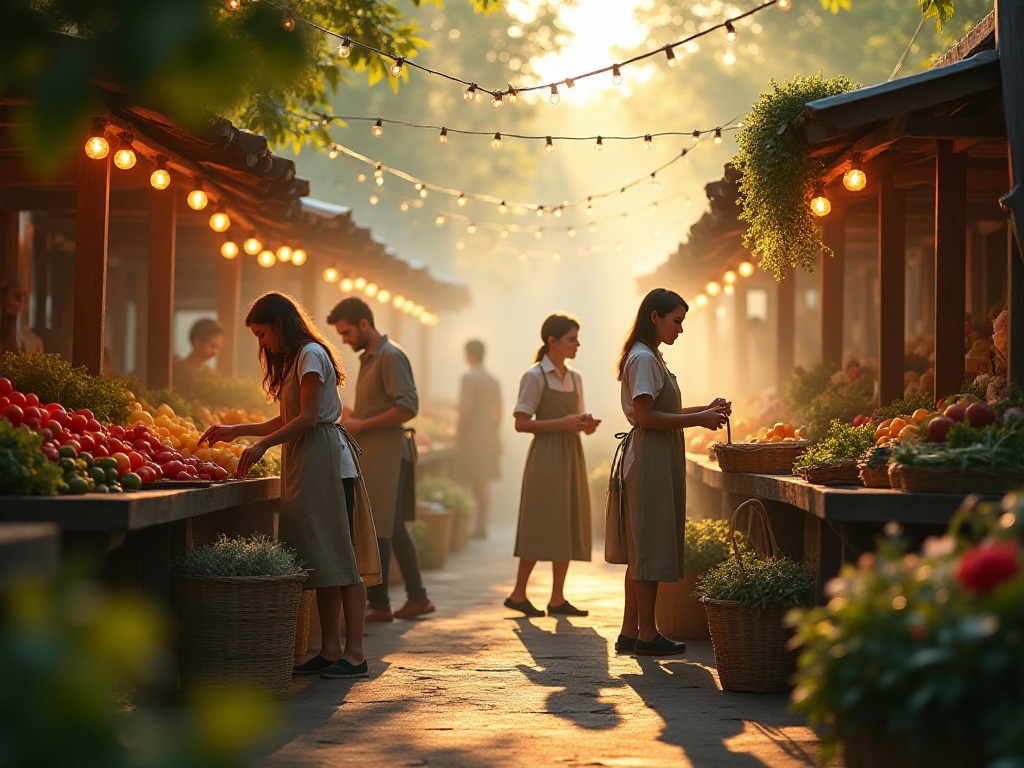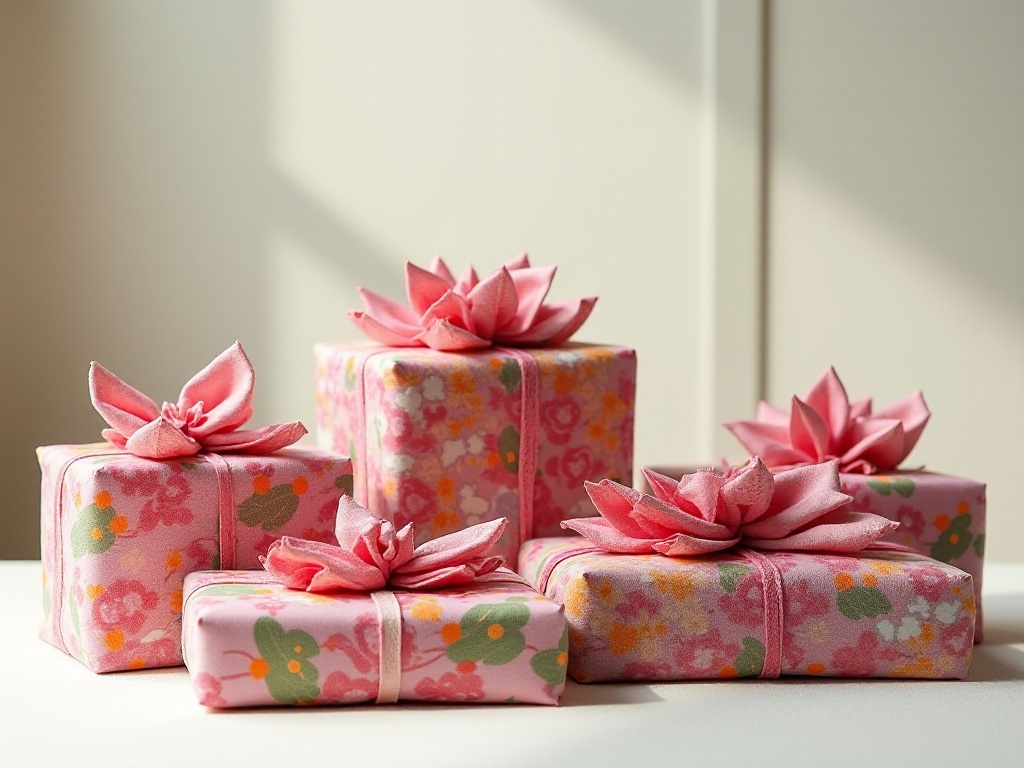Origins
A few days ago while cleaning my room, I was shocked by what I saw. Various takeout containers were piled up in corners like small mountains, with disposable drink bottles, delivery packaging boxes, and shopping bags scattered everywhere. Suddenly I realized that as someone pursuing an elegant lifestyle, I seemed to be quite "wasteful."
Thinking carefully, just from the takeout I ordered last week, I used more than ten plastic containers. Every time I went downstairs to buy bubble tea, it was another disposable plastic cup; with online shopping, there were countless plastic foam pieces and tape in the product packaging. Where did all this garbage end up? How long would they exist on Earth? These questions started making me anxious.
After some thinking and research, I discovered the concept of "zero waste living." Although achieving complete zero waste might be difficult, reducing waste and being kind to the Earth should be something every modern person needs to think about. So I decided to give myself a 21-day zero waste life challenge first, to see exactly what level I could achieve.
Preparation
To make this experiment more convincing, I spent an entire day categorizing and counting all the garbage in my home. The counting process was truly eye-opening - the amount of waste we generate in daily life is far more than imagined.
Plastic items accounted for 63% of total waste, a truly frightening number. Detailed analysis showed that disposable utensils and packaging materials made up 41% of this. Most of these plastic products are used for less than half an hour but will exist on Earth for hundreds of years. Paper waste accounted for 25%, mainly delivery boxes, shopping bags, and various product manuals. The remaining 12% was kitchen waste, including leftover food, fruit peels, and vegetable leaves.
Looking at these figures, I set myself an ambitious goal: to reduce my daily waste by 70% over the next 21 days. Does this goal sound a bit crazy? But after detailed planning, I found this goal was actually achievable.
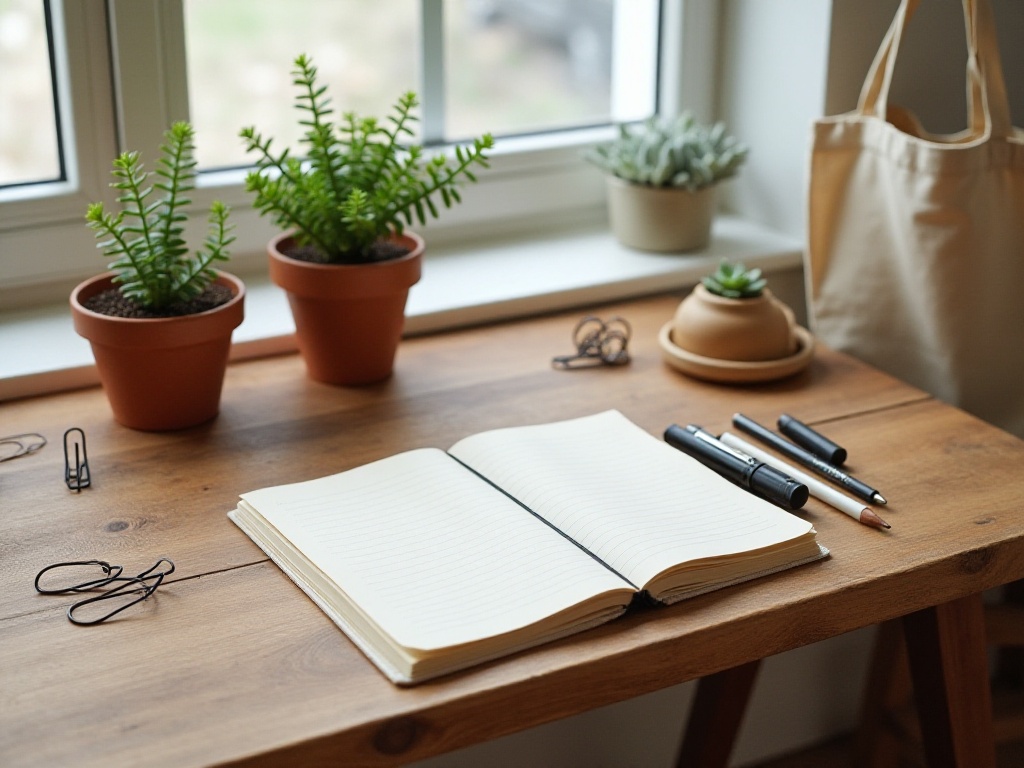
Week One
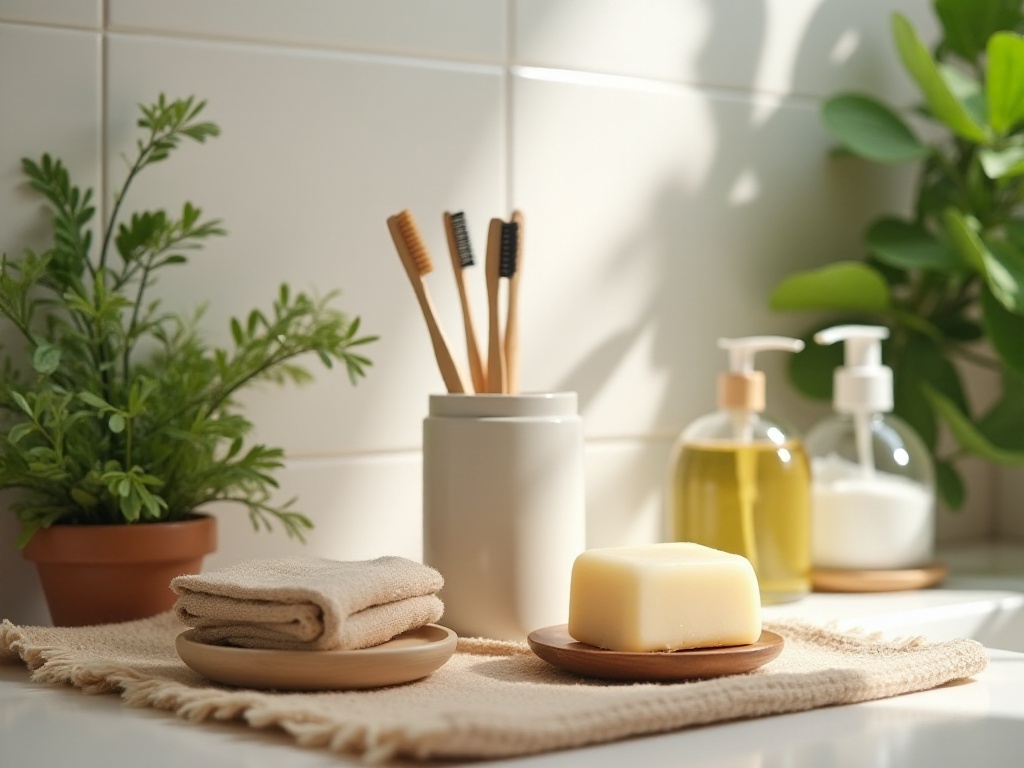
Personal Equipment
The first step in zero waste living is preparing a set of personal equipment. I researched many zero waste bloggers' recommendations and finally compiled a set of equipment suitable for myself.
First is a 600ml stainless steel thermos, chosen because it can hold a standard bubble tea portion while not being too heavy. This thermos cost me 89 yuan, slightly more expensive than regular ones, but its mouth design is particularly suitable for bubble tea and can directly insert a bubble tea straw.
Then there's a set of bamboo utensils, including chopsticks, soup spoon, and fork, plus a canvas utensil bag. This set only cost 35 yuan, which is incredibly economical compared to disposable utensil sets that often cost 10-20 yuan each. The advantage of bamboo utensils is that they're both lightweight and environmentally friendly, and most importantly, they have quality and feel special to use.
The foldable shopping bag is my new favorite, I chose an ultra-light model that fits in your palm for just 19.9 yuan. It uses special fabric with strength comparable to regular shopping bags but only one-tenth the volume. I now carry it with me all the time for unexpected needs.
The stainless steel straw was my most painful purchase at 45 yuan per piece. But considering its lifespan and cleaning convenience, this price is still reasonable. I chose this straw made of food-grade 304 stainless steel, coming with a dedicated cleaning brush, and most importantly, it's the perfect thickness for drinking bubble tea.
Finally, there's a small cloth bag that I made myself from an old T-shirt. It's mainly used for bulk foods like fruits and nuts. Making it myself not only saved money but also gave me a great sense of achievement.
All this equipment added up to about 200 yuan. It might seem expensive at first glance, but thinking carefully, based on my previous consumption habits, just the cup cost for daily bubble tea would be over 60 yuan per month, not to mention other disposable items. So in the long run, these 200 yuan are definitely a worthwhile investment.

Shopping Revolution
After getting this equipment, my shopping methods underwent a complete transformation. My first experience bringing my own bags and containers to the supermarket was truly unforgettable.
I remember confidently taking my cloth bag to weigh bulk nuts, but the cashier showed a confused expression and had to call a supervisor to confirm if this was allowed. Although it was a bit awkward, I patiently explained my environmental concept, and surprisingly, the cashier not only understood but praised my innovative thinking.
After a week, I counted the number of plastic bags saved - it was actually 12! According to data, a regular plastic bag takes about 450 years to decompose. In other words, my actions this week reduced environmental burden equivalent to 5400 years. This number gave me a great sense of achievement.
Besides shopping bags, I also started paying attention to choosing bulk foods and simply packaged goods. For example, I now buy loose fruits and put them directly in my cloth bag. When buying shampoo and shower gel, I choose large family sizes instead of small bottles. This not only saves money but also greatly reduces packaging waste.

Week Two
Kitchen Transformation
Entering the second week, I turned my attention to the place that generates the most waste in the house - the kitchen. After careful observation, I found there were too many things that could be optimized in the kitchen.
First is the preservation issue. I used to be very dependent on plastic wrap, wrapping almost all leftovers with it. But plastic wrap is not only difficult to degrade but also has to be thrown away after one use, which is particularly wasteful. After research, I bought a set of silicone food covers and glass food containers.
The biggest advantage of silicone food covers is that they can be reused repeatedly and have excellent sealing effects. I bought six different sizes, spending 128 yuan in total. For glass food containers, I chose a five-piece set from a well-known brand, costing 169 yuan. Although the initial investment in these preservation tools seems significant, they can last 3-5 years, making them very economical when averaged out.
More importantly, this preservation solution helps me save about 20 square meters of plastic wrap every month. Keep in mind that plastic wrap is made of polyvinyl chloride (PVC), which is almost impossible to completely degrade in the natural environment. The environmental benefit of reducing plastic wrap use is obvious.
I also found that using glass containers to store ingredients is not only more environmentally friendly but can also go directly into the microwave for heating, saving the trouble of finding new containers. The transparent glass material also lets me see what's stored inside at a glance, preventing ingredients from spoiling due to forgetfulness.

Cleaning Innovation
Speaking of kitchen cleaning, what surprised me most was the amount of paper towels used. After research, I learned that an average family of three consumes 60-80 rolls of paper towels annually. This is not only a significant expense but also a huge waste of forest resources.
To change this situation, I started using washable cotton cloth wipes. I bought a dozen pure cotton cloths on Taobao for only 35 yuan. These cloths are soft, highly absorbent, and most importantly, reusable.
The initial transition was indeed a bit uncomfortable, feeling that cloth wipes weren't as convenient as paper towels. But after a few days, I found that cloth wipes cleaned just as well as paper towels, and because of their more durable material, they were actually more effective for handling heavy oil stains.
My current approach is to prepare three colors of cloths: white ones specifically for wiping dishes and countertops, blue ones for handling oil stains, and gray ones for wiping the floor. Dirty cloths go straight into the washing machine to be washed with regular laundry. This is not only environmentally friendly but actually more hygienic than the disposable paper towels we used before.
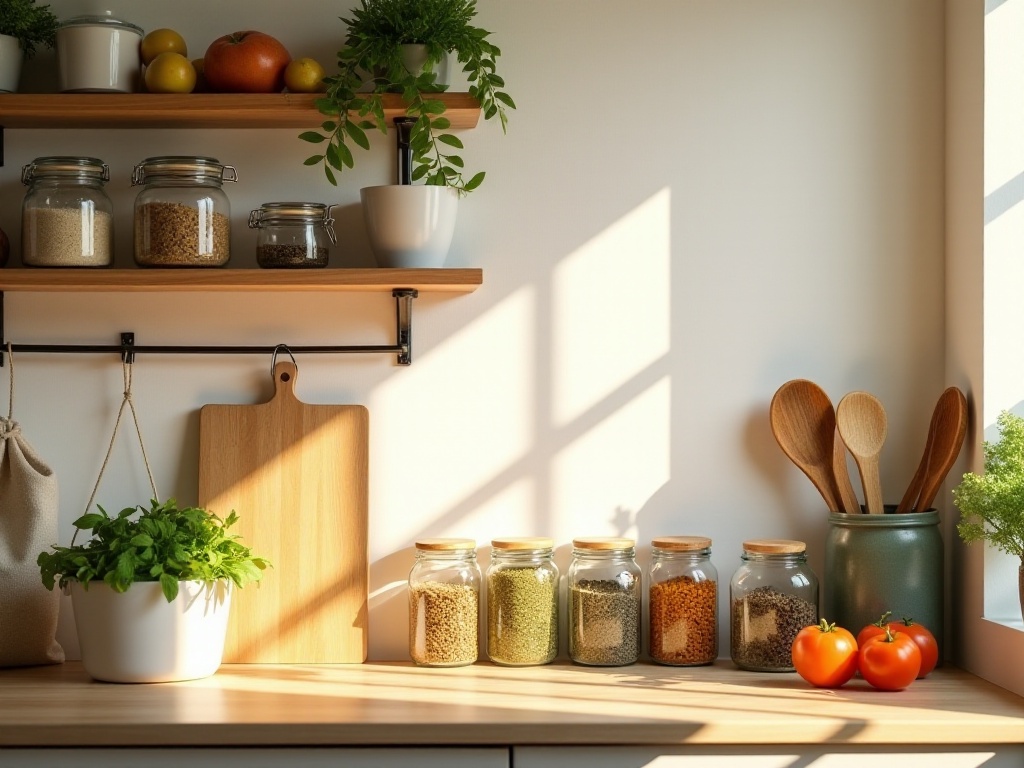
Week Three
Unexpected Benefits
By the third week, I started experiencing various unexpected benefits of zero waste living. First were the economic benefits. I made a detailed expense report and found I saved at least 300 yuan in daily life.
These savings came from several aspects: first, no longer buying disposable items like bottled water and disposable utensils saved at least 100 yuan monthly. Second, reducing takeout orders because bringing my own utensils made me more inclined to dine in, which was not only cost-saving but healthier. Finally, shopping became more rational, and I wouldn't impulsively buy unnecessary things anymore.
The improvement in home environment was another unexpected gain. Because I now consider necessity more before buying things, my home storage space actually became more spacious than before. Corners that used to be occupied by various delivery boxes and shopping bags are now cleared out.
What delighted me most was how this lifestyle influenced friends around me. My roommate saw how convenient my cloth shopping bag was and started learning from me; colleagues at work saw me bringing my own utensils and followed suit, and now five people in our office have joined the zero waste action.
New Habits
After trying basic zero waste actions, I started challenging some more difficult projects. For example, making my own cleaning agent, an idea that initially came from an environmental blogger's recommendation.
I made a batch of enzyme cleaner using fruit peels, brown sugar, and water. The specific method is: prepare a large glass bottle, put in chopped fruit peels, add an equal amount of brown sugar, then pour in three times the amount of water, seal and ferment for two months. Although the waiting time is quite long, the cleaning effect of the finished product was surprisingly good, and it had none of the harsh smell of chemical cleaners.
This homemade cleaner is not only environmentally friendly but also economical. Regular kitchen cleaners cost 20-30 yuan per bottle, while my homemade cleaner costs less than 10 yuan in materials yet lasts a long time. Most importantly, it's made from kitchen waste, truly turning waste into treasure.
Another new attempt was composting. I set up a small corner on the balcony specifically for handling kitchen waste. Through online learning, I mastered basic composting techniques. Daily organic waste like fruit peels and vegetable leaves can be turned into fertilizer for plants after composting. Although the process is a bit troublesome, requiring attention to moisture control and ventilation, seeing garbage turn into fertilizer gives me a special sense of achievement.
Experiment Summary
The 21-day zero waste life experiment achieved results beyond my expectations. Not only did I complete the initial goal of 70% waste reduction, but I actually reduced my life waste by a full 75%.
Specifically, plastic waste decreased from 3.2 kg per week to 0.7 kg. This change was mainly due to replacing daily items and changing shopping habits. For example, using cloth bags instead of plastic bags, choosing bulk foods rather than over-packaged goods, etc.
The reduction in kitchen waste was even more significant, dropping from 2.1 kg per week to 0.3 kg. This was mainly achieved through composting, with most kitchen waste being recycled. It not only reduced waste volume but also provided natural fertilizer for my plants.
Economically, I saved about 400 yuan in monthly expenses. These savings came from reducing purchases of disposable items, avoiding impulse consumption, and making some daily necessities myself. Although some initial investment was needed to purchase reusable items, in the long run, these investments were all worthwhile.
But the biggest gain from these 21 days wasn't these numerically measurable achievements, but the transformation in thinking. Now, every time I want to buy something new, I ask myself several questions: Is this really necessary? Is there a more environmentally friendly alternative? How will it be disposed of after use?
This change in thinking has made my life simpler and more environmentally friendly. Although sometimes it takes a bit more time to be environmentally friendly, thinking about contributing to protecting the Earth makes all these efforts meaningful.
Actually, zero waste living doesn't mean completely eliminating waste, but rather approaching consumption with a more rational and responsible attitude. It made me understand that even small changes from each person can potentially make a huge impact. If more people join this action, our Earth will definitely become more beautiful.
Friends, why not start now, beginning with one small change? Maybe it's carrying a water bottle, or bringing a cloth bag when shopping - these tiny actions are all ways of caring for the Earth. Let's start our own zero waste life together!
Related articles


